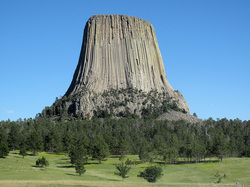
“And I am not finished.”
Then there was the tentative reassurance from Utah’s governor, who last week said of the president, “I would expect that he’s not” going to “blindside” the state by declaring another national monument.
| | If nothing else, the Antiquities Act of 1906 is evidence of what probably would have happened if George Washington had been made a king instead of the nation’s first president. And it’s proof that humans — and especially humans who live in the American West — don’t like others making decisions about them without asking their opinion. Governors don’t usually go around worrying about what the president might do to them by proclamation. But they do when it comes to taking federal land and locking it up as a national monument. In Utah, where 66.5 percent of all land is federal land, that can affect a lot of things. And in 1996, President Clinton didn’t even bother to come to Utah to make his Grand Staircase-Escalante edict. In a nation that values a public process that includes checks and balances, the declaration of public monuments has somehow been given the process used by kings and dictators. The Antiquities Act allows the president to set aside public land as national monuments to protect “historic landmarks, historic and prehistoric structures, and other objects of historic or scientific interest.” Presidents are only human, and humans imbued with power can do much with such latitude. But then, Americans inherently know that, right? You will notice that no one in Alaska or Wyoming is worried even a little bit about what President Obama may do. That’s because after President Jimmy Carter declared 56 million acres worth of national monuments in Alaska, Congress agreed to limit future declaration there to 5,000 acres. And Wyoming? Back in 1943, President Franklin D. Roosevelt paused from his war duties long enough to create a national monument at Jackson Hole. In the lawsuit that ensued, Corp. John J. McIntyre, an attorney, argued that John D. Rockefeller Jr. had offered FDR a gift of 30,000 acres he owned if it were included in an expansion of Grant Teton National Park. Congress refused to expand the park, so the president declared the area a monument, effectively expanding it anyway. McIntyre argued monument contained “no objects of monumental nature,” according to an account in the New York Times. That’s a familiar refrain, but not a terribly effective one. Wyoming lost the lawsuit. However, a few years later Congress agreed to amend the Act to exempt Wyoming. In case you missed the irony there, Wyoming is home to the first-ever designated monument under the Antiquities Act, Devils Tower. In a report on the 100th anniversary of the Act in 2006, the Casper Star-Tribune quoted then-Sen. Craig Thomas saying, “I always ask myself, ‘What is so unique and special that would cause most folks to say that this area is worthy of designation? Then we review the outcome of the study and go through the process of passing a law. It’s a really good way to ensure the integrity of our special places.” Except, of course, that a public process is messy, and Congress won’t always decide to set aside areas that some people feel ought to be preserved. As a result, national monument designation takes on the urgency of counter terrorism. The president has to be nimble enough to respond to threats to sensitive land, just as he is nimble to respond to threats to national security. Except, of course, that with terrorism the president is supposed to go to a secret Foreign Intelligence Surveillance Court to approve his administration’s actions. This isn’t an argument against protecting beautiful or sensitive lands. It is an argument that public processes lead to consensus, while dictates foment anger and resentment. It is also an argument that exempting two large and scenic states is arbitrary and unfair. Utah Rep. Rob Bishop is sponsoring a bill that would require a public hearing and environmental review for every new monument over 5,000 acres. It passed the House, but if you listen to its critics, you would think it was a threat to the republic. That’s a bit ironic, too. |

 RSS Feed
RSS Feed

